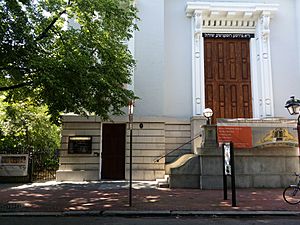Society Hill Synagogue facts for kids
Quick facts for kids Society Hill Synagogue |
|
|---|---|

The synagogue in 2013
|
|
| Religion | |
| Affiliation | Judaism |
| Rite | Unaffiliated |
| Ecclesiastical or organizational status | |
| Leadership |
|
| Status | Active |
| Location | |
| Location | 418 Spruce Street, Philadelphia, Pennsylvania |
| Country | United States |
| Architecture | |
| Architect(s) |
|
| Architectural type | Church |
| Date established | 1967 (as a congregation) |
| Completed |
|
| Direction of façade | North |
The Society Hill Synagogue is a Jewish place of worship located in the Society Hill area of Philadelphia, Pennsylvania. It is a special community that welcomes everyone.
This synagogue is home to over 300 families. It offers many activities, including services for Shabbat (the Jewish day of rest) and holidays. There's also a playschool for young children and a Hebrew school for older students. The synagogue also has programs for adults, social events, and activities that help the community.
Contents
History of the Synagogue Building
The Society Hill Synagogue building has a long and interesting history. It is located at 418 Spruce Street. The building was first designed in 1829 by an architect named Thomas Ustick Walter. It was originally built to be a Baptist church.
In 1910, a Jewish group called Congregation Beth Hamedrash Hagadol Nusach Ashkenaz bought the building. Soon after, its name changed to the Roumanian American Congregation. This congregation was also known as "Or Chodash-Agudas Achim," which means "New Light-Union of Brethren." Later, the Society Hill Synagogue took over the building.
The synagogue also built a new learning center next door in 2021. The historic building is part of the Society Hill Historic District. This district was added to the National Register of Historic Places in June 1971.
The Building as a Baptist Church
The building at 418 Spruce Street was designed for the Spruce Street Baptist Church. Thomas Ustick Walter, who designed it, was also a leader in the church. In 1851, the church building was made larger. Walter designed a new front (façade) with small towers on the sides. More additions were made to the back of the building in 1871 and 1877.
The Spruce Street Baptist Church moved to a new location in West Philadelphia in 1908. Today, it is still an active church in Newtown Square.
The Great Roumanian Shul
The building was sold in 1910 and bought by the Roumanian American Congregation. This group was formed by two smaller congregations joining together. It became known as the Great Roumanian Shul.
This synagogue was important for Eastern European Jewish immigrants in Philadelphia. It was a center for the city's Roumanian Jewish community. Many meetings and events were held there.
After World War II, the Society Hill neighborhood changed. Many Jewish families moved to the suburbs. The synagogue's membership went down, and the building started to fall apart by the 1960s.
Society Hill Synagogue Today
In the 1960s, a new group of Jewish families in Society Hill wanted a spiritual home. This new group bought the building in 1967.
Restoration work on the building began in 1968. Architect Henry J. Magaziner led the project. The restoration cost $300,000. It included fixing the old building, repairing the front, and adding modern features like air-conditioning and a new kitchen. At that time, there were about 100 families in the synagogue.
More work was done in 1971. The building is recognized as a Philadelphia City Landmark. It is also on the state and National Registers of Historic Places. In 1985, architect James A. Oleg Kruhly designed a new addition. In 2005, the synagogue completed more than $80,000 worth of interior work. This included adding a permanent study hall called a Beit Midrash.
The synagogue bought the building next door in 2007 to add more classrooms. Between 2007 and 2019, the Society Hill Synagogue raised over $4 million. This money was used to buy the neighboring building and make big improvements to both properties. Construction started in 2020 and finished in 2021.
In June 2021, the synagogue opened its new three-story Paula Kline Learning Center. This new center is connected to the historic synagogue building. The construction expanded the social hall and renovated the Beit Midrash. It also added six new classrooms and a large private courtyard. An elevator and restrooms were also added to make the building accessible for everyone.
The congregation is independent, meaning it doesn't belong to one specific Jewish movement. Its services combine traditions from different Jewish groups. Society Hill Synagogue welcomes all kinds of people. This includes families with different religious backgrounds, LGBTQ+ individuals, people of color, and people with all abilities.
Ivan Caine was the Rabbi from the synagogue's start in 1967 until 2001. Cantor Alan Cohn served the synagogue from 1974 to 2000. Avi Winokur was the Rabbi from 2001 to 2020. Nathan Kamesar became the Associate Rabbi in 2018 and then the main Rabbi in July 2020. Hazzan Jessi Roemer has been the Cantor since 2018. Today, the synagogue has over 300 member families. It also has almost 70 children in its Playschool and over 80 children in its Hebrew School.
See also
 | Lonnie Johnson |
 | Granville Woods |
 | Lewis Howard Latimer |
 | James West |


